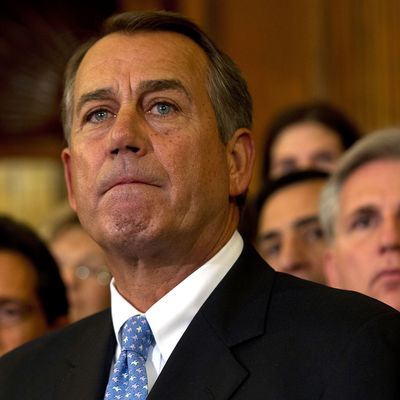
For the first time in the Obama presidency, cracks have appeared in the wall of total opposition that has defined the Republican party’s approach. Many harbingers of Republican compromise have suddenly appeared.
John Boehner’s original public post-election comments about the desirability of increased revenue was nothing but a restatement of his old position that it would be nice if we cut tax rates and economic growth created more tax revenue. But his private message to his party, the New York Times reports, struck a more conciliatory note:
Their party lost, badly, Mr. Boehner said, and while Republicans would still control the House and would continue to staunchly oppose tax rate increases as Congress grapples with the impending fiscal battle, they had to avoid the nasty showdowns that marked so much of the last two years.
The contrast with the GOP approach to Obama’s first election is striking. When House Republicans met in the wake of the 2008 elections, they set out a strategy of total opposition, calculating that it offered their clearest path to returning to power.
Meanwhile, Mitch McConnell gave an interview to The Wall Street Journal editorial page in which, buried beneath a tone of sneering defiance, he seemed to shift his bottom line dramatically leftward. Check out the last line:
The $16 trillion question: How much is Mr. McConnell willing to give on taxes in exchange for those entitlement reforms? “The country doesn’t need a tax increase; we have a spending problem. But they control a big part of the government and they insist on taxes. I’d be willing to pay the ransom [of higher taxes] if I thought we were going to get the hostage out.” By that he means every dollar of taxes would have to be matched by a dollar of entitlement savings.
That’s a bottom line of one dollar in spending cuts for every one dollar in higher taxes. Recall that the most recent position of the GOP was that even ten-to-one ratio of spending cuts to tax hikes was unacceptable.
And conservative thought leaders are starting to question the party’s absolutist stance on taxes. Weekly Standard editor William Kristol blurted out yesterday, “You know what? It won’t kill the country if we raise taxes a little bit on millionaires.’ It really won’t, I don’t think.” Kristol is generally happy to go along with the Republican party line on virtually everything, but he’s not happy to watch the party continually lose elections by lashing itself to the unpopular cause of defending lower tax rates for the rich above all else.
And even some conservatives who like the party’s anti-tax fundamentalism may be starting to realize that it lacks the leverage to defend that stance anymore. Conservative pundits Conn Carroll and Ben Domenech agree, “If the tax cuts do expire there will be no “deal” — Obama will dictate all terms.”
All this is absolutely true. The Republicans committed an enormous blunder by refusing to strike a budget deal with Obama in 2011, when he was desperate enough to offer them one with irresponsibly large concessions. Republican obstinacy would have paid off if they defeated Obama and got a shot to write their own tax-cut plan. But they left themselves massively exposed in the case of an Obama victory. The entire Bush tax cuts — $4 trillion over a decade — have been set to expire at the outset of 2013. An Obama election was always going to give him enormous sway, creating a situation where Republican refusal to agree to a small or medium-sized tax hike would mean a huge tax hike.
One way to make sense of the Republican gamble is to read the various postmortems revealing the degree to which the entire party resided in a bubble of delusion about the state of public opinion. I argued that Mitt Romney’s projections of eerie, counter-factual optimism were a bluff designed to create a self-fulfilling narrative of momentum. I overestimated his campaign. Romney actually believed he was on the cusp of victory, and the entire party relied on systematically skewed polling.
Across the party’s campaigns, committees and super-PACs, internal polling gave an overly optimistic read on the electorate. The Romney campaign entered the last week of the election convinced that Colorado, Florida, and Virginia were all but won, that the race in Ohio was neck and neck, and that the Republican nominee had a legitimate shot in Pennsylvania.
The bursting of the bubble of unreality enveloping the whole Republican party has given Obama’s victory all that much more shocking force. A couple months before the election, when reporting my article on the post-election economic agenda, I spoke with a high-level Republican staffer in Congress. Two things became clear to me. First, he and his colleagues had done very little thinking about how they would respond to a victorious Obama and his newfound leverage. Second, their fallback position would be to replay the approach they used at the end of 2010, insisting on extending every penny of the Bush tax cuts and assuming Obama would blink.
I suspect that both the jolt of Obama’s victory and the steadfastness of his insistence that he would not extend the tax cuts on income over $250,000 a year has shaken loose some of those assumptions. It’s far, far from certain, and perhaps not even likely, that the Republicans will even cut a deal before January. Even if the Washington party decides to cut its losses and deal with Obama, it will have to reckon with the tea party, the likely revolt of which could easily send Republicans scurrying back to their bunker. Still, at this early date, the basic Republican strategy toward Obama appears to be in flux.






























